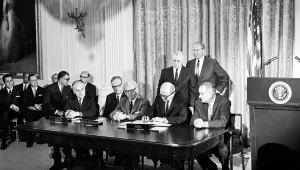Reports & Papers
from
Caspian Studies Program
Remarks by Dr. Steven E. Miller,
Director, International Security Program,
Harvard University
Dr. Miller outlined the evolution of U.S. foreign policy after the terrorist attacks of September 11, 2001, and highlighted the implications of America's new approach, including the current campaign in Iraq, for the Caspian region.
- The war on terrorism, that is, the campaign against Al Qaeda, has significantly changed the strategic geography of U.S. foreign policy.
- The traditional preoccupation with transatlantic issues and East Asia has given way to a preoccupation with South Asia.
- The Caspian basin is now adjacent to a region of prime geostrategic importance to the United States.
- The key zone of contestation is now along the axis of the southern Caspian basin, which includes Iraq, Iran, and Afghanistan.
- The key players now include Pakistan, Uzbekistan, Turkey, and Russia.
- The focus will likely be on South Asia for some time to come because of both the disaffected elements of Islam from which the terrorist threat appears to emanate and the existence in the region of various "stateless zones" in which terrorists can hide and operate.
- Since 9/11, the United States has departed from its habit of relying on traditional alliance frameworks and has instead operated by developing coalitions of the willing and by utilizing "coalitions of coalitions."
- U.S. policy has both much more fluidity and opportunity for states in the region to negotiate roles and relationships.
- The "coalition of coalitions" consists largely of a series of bilateral arrangements worked out between the United States. and those parties that control territory, air space, bases, or intelligence that are needed for the U.S. campaigns.
- Pakistan, Russia, and Uzbekistan are now more important than the traditional NATO allies (with Turkey as an exception).
- After 9/11, the Bush Administration has held that it will not allow state sponsors of terrorism to operate with impunity. It will hold them accountable and punish them.
- Regimes that actively and directly support terror attacks against the United States will be forcibly removed.
- Afghanistan's Taliban regime was the first case and was meant as a lesson to others.
- The concern with state sponsors of terrorism will keep U.S. attention focused on the wider Caspian neighborhood: Iraq, Iran, Syria, and possibly Pakistan.
- The Bush administration's policy on WMD proliferation overlaps with and reinforces some elements of the war on terrorism. The Bush doctrine of preventive war underscores that the United States will not tolerate acquisition of WMD by hostile powers.
- Two of the three most urgent cases -- Iraq and Iran -- are in the Caspian neighborhood.
- Pakistan is a source of concern.Instability and possible regime change there could mean that nuclear weapons fall into hostile hands.
- There is a new preoccupation with failed states as a source of instability and terror.
- Afghanistan failed and showed the world the dangers involved in failed states.
- After forcible regime change, Iraq will be a destroyed state in need of reconstruction.
- These are likely to be long-term projects.
- Energy: the fossil fuel connection.
- The impact of war in Iraq on global energy supplies is a question mark.It could lead to higher or lower prices. Oil fields may be destroyed or left intact.
- A result of war in Iraq may be instability in Saudi Arabia. There may be disruption of internal or regional harmony.
- 9/11 and its aftermath significantly altered relations among some of the major powers in ways that had implications for the Caspian.
- Relations between the United States and Russia changed. Russia is important in part because it is seen as key to U.S. access to the Caspian. The improvement in U.S.-Russian relations has been significant in facilitating U.S. efforts in the region.Is this relationship now eroding?
- China had its own aspirations regarding energy in the Caspian basin and sees the raised U.S. profile in the region as a disappointing strategic setback.
Conclusions:
- Several of the above points converge in the Iraq case, which explains why it is at the top of the Bush Administration's target list.
- The three wars of the Bush Administration -- Al Qaeda, Afghanistan, and Iraq -- have greatly elevated the strategic significance of the greater Caspian basin.
- Reflecting that greater strategic significance, there is a considerably higher U.S. presence and profile in the Caspian basin, which is likely to be enduring if not permanent.
- The combination of strategic significance and oil reserves gives the states of the region some cards to play in relations with the United States. For example, Uzbekistan provided access to the United States and received U.S. favor in return.
Recommended citation
Miller, Steven E. “Current Trends in U.S. Foreign Policy: Implications for the Caspian.” Caspian Studies Program,
Up Next




